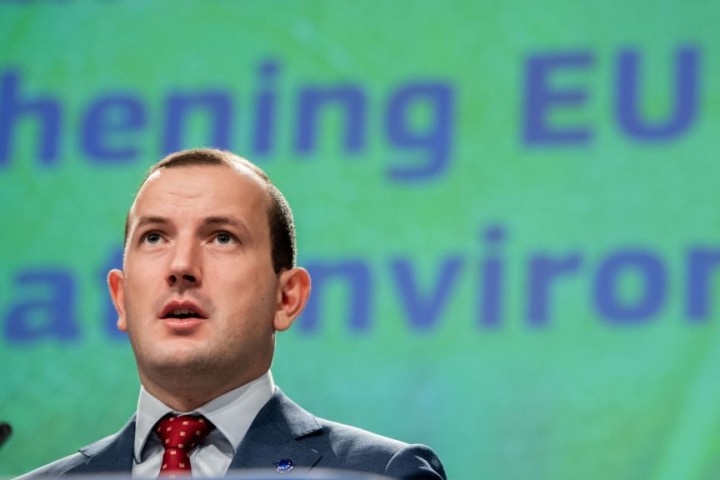Brussels wants 10-year prison term for severe environmental damage

Environmental crime is the fourth largest criminal activity in the world after drug trafficking, human trafficking and counterfeiting, according to the European Commission.
The most serious offences include illegal trafficking in waste and wildlife species, pollution crimes, and illegal trading in hazardous substances, which are currently covered by the 2008 Environmental Crime Directive.
However, sanctions and prosecution are not always dissuasive enough, according to the EU executive, which proposed a revision of the law that obliges EU countries to crack down on environmental crime.
“Too often in Europe, there is no real penalty for environmental crime. Lawbreakers can go unpunished and there are too few incentives to observe the law,” said EU environment commissioner Virginijus Sinkevičius who presented the proposal on Wednesday.
“We have to be clear environmental crimes are not victimless. They can cause irreversible long term damage not only to ecosystems but also to people’s health,” he continued.
“We want to change that by proposing a new directive on environmental crime, which will strengthen environmental rule of law,” he added.
The scope of the directive was also broadened to include activities such as the illegal trade in timber, ship recycling and abstraction of water, alongside others.
The proposal also sets out an EU-wide minimum sentence for severe environmental crimes. That includes maximum imprisonment of at least 10 years if the offence is likely to or has caused death or serious injury and, for companies, a financial penalty of up to 5% of global turnover.
Alongside this, the European Commission aims to improve prosecution and deterrence by cooperating with national enforcers to tackle crimes. This includes providing training and resources for inspectors, police, prosecutors and judges to make investigations and criminal proceedings more effective.
“It is of paramount importance that member states step up their efforts in preventing, investigating and prosecuting environmental crimes. It is thus very important that appropriate financial and human resources are allocated,” said Ilhan Kyuchyuk, an EU lawmaker with the centrist Renew Europe political group in the European Parliament.
The proposal also provides support to environmental activists, who can risk their lives standing up for nature, with obligations for EU countries to assist those who report on environmental offences.
It is unusual for crimes to be regulated at the EU level. However, because illegal environmental damage is often part of organised crime and has transboundary damage, the European Commission has stepped in.
Once the legislation is adopted, however, it will be up to EU countries to enforce it. Whether it is successful or not, depends on how well they do that.
“In the end, it’s down to public prosecutors to use the tools they’re being given but in theory, [the revision] should expand the toolbox with a lot of different tools,” said Frederik Hafen, from the European Environmental Bureau (EEB).
But “environmental crime still does not look like a priority for many of the member states, if not for all,” Green MEP Marie Toussaint told EURACTIV.
“This time, the Commission will need to be more demanding concerning its transposition, and engage infraction procedures if the member states do not comply,” she added, saying that providing proper resources is key and that the EU executive needs to clarify how it will finance these.
Strengthened proposal with several loopholes
Environmental organisations have had a mixed reaction to the revision. Overall, the proposal goes in the right direction and recognises the seriousness of environmental crimes, according to Hafen.
But he criticised the lack of a universal definition of environmental crime, saying “discussions about ecocide and crimes against the right to a healthy environment are being stopped dead in their tracks.”
The punishments, too, lack consistency with other areas of EU law, said Hafen, who pointed out that financial penalties on companies breaching environmental law can reach up to 5% of global turnover. This is much lower than in EU competition law, where the penalty is set at a maximum of 10% of global turnover.
There are also some activities that the European Commission did not include, like illegal fishing, which “leaves the door wide open to overfishing and undermines our ocean’s ecosystem and its ability to mitigate climate change,” according to Client Earth lawyer Nils Courcy.
Ecocide is also not yet considered a crime under EU law, something that the European Parliament may decide to push during the negotiations with EU member states on the revision of the environmental crime directive.
Earlier this year, lawmakers and NGOs joined forces to call on the European Commission to recognise ecocide under the legislation.
“We also need to change the approach to environmental crimes, to recognise the intrinsic value of nature and to condemn those who damage the ecosystems. This is not the approach adopted by the Commission, who hesitated for a while, but ended up abandoning the idea to criminalise autonomous crimes against the environment and the crime of ecocide,” said Toussaint, one of the signatories to the letter.

